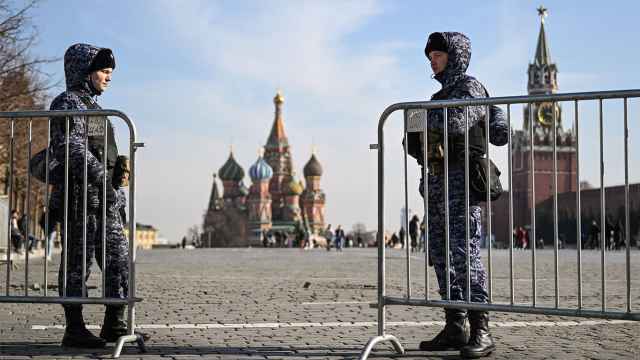The Pussy Riot case is a useful case study to understand the religious views of a large segment of Russia's Orthodox Christian community, a group I will call "Homo Orthodoxus."
First, this belief holds that God does not forgive. A typical example: During a recent demonstration against Pussy Riot, an Orthodox activist screamed "God does not forgive, and to claim otherwise is blasphemy," while beating a female supporter of the punk group. This unforgiving nature is such an important characteristic of God for the Homo Orthodoxus believers that they hold it in a category apart from the direct commandments of Christ.
The second belief of Homo Orthodoxus is that God bestows lavish material gifts on the church's leadership: luxury apartments, fancy cars and expensive Swiss watches. For the Homo Orthodoxus, such perks are part of being close to the Godhead. This is clearly reflected in Moscow's Christ the Savior Cathedral, a commercial venue where pricey VIP tickets allow people to view the cathedral's holy relics without standing in the typically long line.
Third, this God does not make any moral demands on his chosen followers but gives them full authority to make such demands on everybody else. This is a very important point. Christianity — at least theoretically — is a system of moral obligations that an individual willingly assumes. But the Homo Orthodoxus system is constructed differently. It allows for church leaders to own a five-star "monastery" in Bakovka and a swanky dacha in the Black Sea resort town of Gelendzhik. These are the blessings that God has bestowed upon them, and those who criticize the church are sinners.
Fourth, Homo Orthodoxus place the government authorities on a par with God. According to this view, President Vladimir Putin is a divine avatar who hands out Mercedes automobiles and pricey villas to the "faithful," while meting out punishments to those who dare to question the righteousness of the regime and the church.
All of this bears little resemblance to the morals-based form of Christianity reflected in the words and lives of Count Leo Tolstoy or Pope John Paul II.
The Homo Orthodoxus belief system could not even properly be labeled as pagan. That would be unfair to the ancient Romans and Confucians who developed a strict moral code for their adherents.
The Homo Orthodoxus religion more closely resembles primitive Australian totemic beliefs, a Stone Age religion that entirely replaces the idea of a moral code with ridiculous prohibitions, neurotic taboos and a primitive, spiteful and petty god who lavishes his believers with worldly goods and punishes his enemies.
But Putin and Patriarch Kirill are mistaken in thinking that most Russians belong to the Homo Orthodoxus order. It is an easy mistake to make. After all, when you are an idol worshipped by millions, you can easily conclude that everyone is devoted to you.
The problem is that although most of Putin's friends and associates are devoted members of Homo Orthodoxus, actual believers comprise a small minority in the population at large.
Russia can be characterized in various ways: fragmented, prone to drunkenness, faithless, Westernized or semi-Asiatic. It is difficult to say exactly. But one thing is certain: Russians are not prepared to revert to a primitive totemic belief system that gives spacious apartments, luxury cars, personal servants and other worldly benefits to the self-appointed secular and spiritual leaders of the country.
Russia passed through that stage of human development centuries ago. But if today's leaders remain stuck in that stage, it only means the regime is doomed to fail.
Yulia Latynina hosts a political talk show on Ekho Moskvy radio.
A Message from The Moscow Times:
Dear readers,
We are facing unprecedented challenges. Russia's Prosecutor General's Office has designated The Moscow Times as an "undesirable" organization, criminalizing our work and putting our staff at risk of prosecution. This follows our earlier unjust labeling as a "foreign agent."
These actions are direct attempts to silence independent journalism in Russia. The authorities claim our work "discredits the decisions of the Russian leadership." We see things differently: we strive to provide accurate, unbiased reporting on Russia.
We, the journalists of The Moscow Times, refuse to be silenced. But to continue our work, we need your help.
Your support, no matter how small, makes a world of difference. If you can, please support us monthly starting from just $2. It's quick to set up, and every contribution makes a significant impact.
By supporting The Moscow Times, you're defending open, independent journalism in the face of repression. Thank you for standing with us.
Remind me later.





